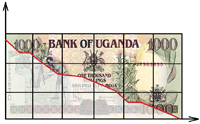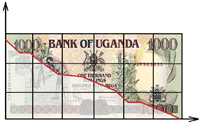Credit Crisis Bites Uganda Shilling

 |
| Succumbing to Economic Pressure |
Figures from Uganda’s money markets indicate that the shilling is already on a downward spiral. By early this week, the dollar was trading at Shs1,800 after spending the biggest part of the last three months firmly stuck below the Shs1,700 mark. Economists attribute this depreciation to the current global crisis.
“The [Uganda] shilling has started to depreciate due to the current nervousness in the [global] financial markets. The financial turmoil implies that investors are selling off emerging market currencies for assets, and that is adding pressure to the shilling,” said Yvonne Mhango, Stanbic Bank’s Africa Head of Research. She added: “At this time, investors are wary, they are nervous, they are pulling their short-term investments out of emerging markets because they are considered to be high risk and they are putting them in safe havens like gold and US treasury instruments.”
Speaking at a Stanbic bank Uganda organized conference to discuss the current financial market trends, she said that countries like Uganda are bound to experience a slowdown in capital inflows as tourists postpone their vacation trips and Ugandans working abroad, the country’s biggest export in terms of earning, suffer from the global crisis.
The other traditional Uganda‘s exporters shouldn’t worry much about the dollar’s strength as that only favours their earnings. But the fact that the global economy is experiencing a slowdown in growth means that demand for such goods could also suffer.But on the other side however, the shilling’s depreciation is bound to make it more expensive for importers to buy goods and services.
Razia Khan, Standard Chartered Bank’s Head of Research for Africa agrees. She says: “The cost of importing a container is exorbitant because Uganda is landlocked. That is why any small change in the foreign exchange in either direction will have such a great bearing on their profit margin because they are producing from that disadvantageous position to begin with.” The importers are likely to use a lot more of the Uganda shilling to buy dollars in order to import commodities, which are priced in dollars. And in order to recoup their investments, importers will have to sell their products at a higher price.
A spike in the prices of imports could see a further downward revision of Uganda’s economic growth target since the economy is heavily dependent on imports. Business people use a country’s growth target as a barometer to make investment decisions. Uganda is estimated to grow by 9% this financial year.
The shilling’s depreciation also presents a tricky scenario for the central bank. It is not clear how much of the country’s much needed foreign reserves Bank of Uganda is willing to put on the market to rescue the national currency from sliding further.
But what is more worrying is that further depreciation of the shilling is expected to strain efforts of controlling the country’s rate of inflation. Uganda’s rate of inflation is estimated at 15% - three times more than the central bank’s target of 5%. The surge in inflation increases the cost of production and tends to keep interest rates charged on credit high.
Keeping the value of the shilling from going further down – and thus controlling the rate of inflation – is bound to be the central bank’s hardest homework in the coming days. In trying to maintain a stable exchange rate, the Bank of Uganda at times uses the country’s foreign exchange reserves to manipulate the price of the dollar.
Recent arguments by the Governor, Tumusiime Mutebile, indicate that the central bank might not be too willing to inject dollars from its foreign reserves, currently estimated at $ 2.2 billion, to save the shilling. Risking more of the country’s foreign exchange reserves to halt any further depreciation of the shilling by pumping more dollars into the economy could turn out to be a huge blunder since the ripple effects from the US financial market turmoil are way beyond Uganda’s scope. There is also a fear that earnings on Uganda’s foreign exchange reserves could slow down.Yet using the other strategy of employing government securities in the form of Treasury Bills and Bonds only goes ahead to increase the country’s domestic debt.
However Razia Khan offers a different perspective to solving the foreign exchange fluctuations. She argues that it is a lot more costly for the central bank to raid money markets in a bid to keep the dollar stable. She explained that this presents more risks of conversion, and is simply a short-term therapy. “There are other things that are far easier to control than the exchange rate,” she said. “Infrastructure like the road and rail network that is contributing to these costs is key, the licensing requirements are also key.”
By Jeff Mbanga
Jeff Mbanga jeff@observer.ug writes for The Weekly Observer
